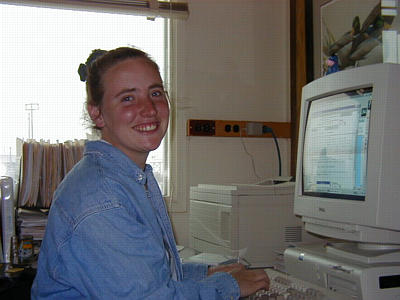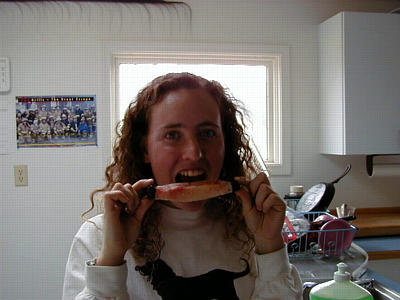17 June, 1999
Thursday, June 17th, 1999
INTERVIEW/ROAD SURVEY/GUEST RESEARCHER: GRACE ABROMAITIS
Hi all! This morning I started my day off with an interview with Fairbanks
National Public Radio to tell them about the program that is sponsoring this
trip for me, Teacher's Experiencing the Arctic and Antarctic (TEA), funded by
the National Science Foundation. I must say thank you (I think) to Renee
Crain at Arcus (Arctic Research Consortium of the United States) for setting
that up.
It was a pretty low key day, since the coastal area here was pretty
fogged in, we felt the visibility was not good enough to search for eiders.
It wasn't until later in the day we realized that INLAND, there may not be so
much fog. We drove out there and, sure enough, it was very clear. OK Waianae
Earth Science class, I know you are out there; why do you think that is true?
So this afternoon we headed out and did some road surveys (by truck),
and some pairs went out on foot and did surveys also. I got to ride in the
truck, due to my fierce blisters (not my idea - I WAS prepared to walk,
truly!) So it was a cushy day for me. When we got back, the crew that is
doing AERIAL surveys (by plane) for Steller's Eiders stopped into the ARF
(Arctic Research Facility) and had dinner with us. We have no more room there
for more people to sleep, so they were sent to one of the wildlife biologists'
house to stay.
Tomorrow is the first blanket toss festival for the town, celebrating
the fact that whale's were harvested. I am excited to see that, and hope that
I get to go! There are going to be five of these festivals in the next week
or so, so if I don't make it tomorrow, I am sure I will get the chance to tell
you about it later.
I have asked different researchers that I am meeting and/or working with
to tell you a little bit about themselves so that you can hear about some of
their interesting projects and what it took to get them in the position they
are in. It might help you to choose a career in the future! Take Care,
Michele Hauschulz (Teacher Experiencing the Arctic)
GUEST SPEAKER: GRACE ABROMAITIS
Hi everyone! I'm a graduate student from the University of Alaska
Fairbanks (UAF) working on my master's degree in marine biology. I grew up in
Pennsylvania, did four years of biology in Boston, and packed my bags for
Fairbanks! It may sound like Fairbanks is cold and inland but it gets quite
warm in the summer and I get to travel to exciting locations to do field work.
For example, Barrow!
I actually work on Thick-billed Murres (a type of seabird) for my
school project. I look at what they eat and use a technique called stable
isotope anlaysis. By looking at the stable isotopes in my birds I can tell
what their prey base is (what they are eating), what their trophic level is
(where they are on the food web in relation to plankton-the plants of the
sea), and how this has all changed in the last century. I hope to use
feathers that have been saved in museums to learn all about this. Through my
project I may also get to do work in Seward, Alaska or travel to Cape Lisburne
where my birds are from and help collect the birds. In that case I would get
to see a seabird colony which is quite fantastic! Lots of birds nesting on
the cliffs at the edge of the ocean. A very confusing sight I am told.
Sometimes, there are so many they run into each other! Going to do research
near the ocean is very important to me!
This project in Barrow is not the first time I have gotten to work
near the ocean, thank goodness. When I came to Alaska I decided that I wanted
a career where I got a chance to work in the field (out of doors with all the
critters) as much as I could. Last summer I did a field course in Kachemak
Bay, Alaska. We lived on the ocean for 5 weeks and learned all kinds of
things about the animals that live in the intertidal zone (the zone between
low and high tide on the beach). We hiked along the beach during low tide,
when all the water was out, and found all kinds of things. We looked at sea
anemones, chitons, clams, sea stars, crabs, tunicates (some are even called
sea peaches), and more. UAF, gives me lots of opportunities to check out my
career options and try to figure out if I really want to go into marine
biology.
This spring, in March, I got to go out on an oceanographic cruise. I
went out on UAF's vessel the Alpha Helix and helped collect water samples,
salinity measurements (the amount of salt in the water), and temperature
measurements for the physical oceangraphers in my department at school. The
physical oceanographers study how the ocean works in a physical sense. They
look at currents, wave action, and a lot more. (I'm sure the physical
oceanographers would groan to see that short description. It is actually a
very exciting field but make sure you take your seasickness pills before
leaving the dock!)
Finally, I came to Barrow. This is actually a volunteer project for me
and has been extremely interesting. I have never had the opportunity to
explore the tundra before. It is spongy to walk on and full of all kinds of
animals that you would think were frozen out of here! The arctic is like the
desert. Both are extreme environments that seem very hostile to living
creatures but house wonderful groups of organisms that all work together. One
lucky part of volunteering here in Barrow is that it allows me to see if I
like working on projects like this. I go home in two weeks and I can think
about it and if I like it I can try find a job in that area or take more
classes while I am in school to help me learn more about that subject.
Well that's it for now. If you have any questions about what I do,
marine biology, or anything feel free to ask. Just e-mail Michele! So...the
sun may never go down here but we still need to sleep so from the land of the
midnight sun-GOODNIGHT! Take care, Grace
____________________________________________________________________
Get your own FREE, personal Netscape WebMail account today at http://webmail.netscape.com.

"Guest speaker" Grace Abromaitis at the computer; kind enough to forego s= leep in order to tell you about what she does! ____________________________________________________________________ Get your own FREE, personal Netscape WebMail account today at http://webm= ail.netscape.com.

Grace eating muktuk (or pretending). Muktuk is whale blubber and skin. ____________________________________________________________________ Get your own FREE, personal Netscape WebMail account today at http://webm= ail.netscape.com.
Contact the TEA in the field at
.
If you cannot connect through your browser, copy the
TEA's e-mail address in the "To:" line of
your favorite e-mail package.
|
